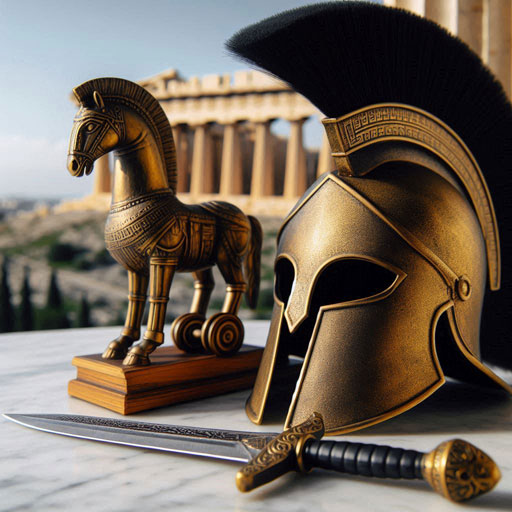Table of Contents
- Introduction
- Early Life and Prophecy
- The Trojan War
- The Wrath of Achilles
- Achilles' Heel: The Fatal Weakness
- Death and Legacy
- Historical Facts and Archaeological Evidence
- Achilles in Popular Culture
- Conclusion
Introduction
Achilles, the legendary hero of the Trojan War, is one of the most iconic figures in Greek mythology. Known for his incredible strength, unmatched bravery, and tragic fate, Achilles' story has been told and retold for centuries. This blog delves into the life and legend of Achilles, exploring his early years, role in the Trojan War, and enduring legacy.

Achilles, the legendary hero of the Trojan War
Early Life and Prophecy
Achilles was born to the mortal Peleus, king of the Myrmidons, and the sea nymph Thetis. According to myth, Thetis dipped Achilles in the River Styx to make him invulnerable, but she held him by his heel, leaving it his only weak spot. This act set the stage for the prophecy that he would die young but glorious in battle.
The Trojan War
Achilles' involvement in the Trojan War was pivotal. He led the Myrmidons with unmatched valor, becoming the Greeks' greatest warrior. His most notable feats included the slaying of Hector, the Trojan prince, in revenge for the death of his close friend Patroclus. This section explores the key battles and events that defined Achilles' role in the war.

The slaying of Hector
The Wrath of Achilles
Achilles' rage is a central theme in the "Iliad." Angered by Agamemnon's seizure of his war prize, Briseis, Achilles withdraws from battle, causing a significant shift in the war's dynamics. This section delves into the consequences of his wrath and the eventual reconciliation with Agamemnon.
Achilles' Heel: The Fatal Weakness
Despite his near invincibility, Achilles was not immortal. The phrase "Achilles' heel" originates from his sole vulnerability. This section discusses how this weakness was exploited by Paris, leading to Achilles' death and the fulfillment of the prophecy foretold at his birth.
Death and Legacy
Achilles' death marked a turning point in the Trojan War. His legacy, however, lived on through the stories and legends passed down through generations. This section examines the aftermath of his death and how his legend continued to influence Greek culture and beyond.

The phrase "Achilles' heel" originates from his sole vulnerability
Historical Facts and Archaeological Evidence
While Achilles is a mythological figure, there are historical and archaeological findings that provide context to the Trojan War and its heroes. This section explores the evidence that suggests a possible historical basis for Achilles and the events surrounding the war.
- Troy's Existence: Archaeological evidence suggests that the city of Troy, the setting for the Trojan War, did exist and was likely a significant trading hub.
- Homer's Influence: The epic poem "The Iliad," attributed to Homer, is one of the primary sources of the Achilles legend, dating back to around the 8th century BCE.
- Mycenaean Greece: The Mycenaean civilization, which thrived during the late Bronze Age, is believed to be the cultural context for many of the Greek myths, including the story of Achilles.
Achilles in Popular Culture
From ancient literature to modern movies, Achilles' story has been a source of inspiration. This section highlights his representation in various forms of media, including the "Iliad," Hollywood films, and contemporary literature.
Conclusion
The story of Achilles is one of heroism, passion, and tragedy. His legacy as one of the greatest warriors in Greek mythology endures, captivating audiences through the ages. This blog has explored the multifaceted character of Achilles, providing insights into his life, his role in the Trojan War, and his lasting impact on culture and history.

